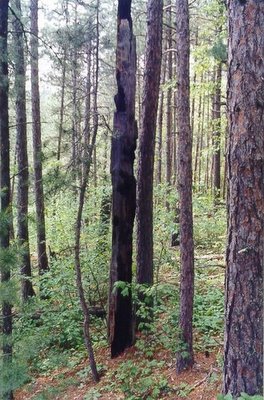In my story about the London Double Decker Bus, I mentioned the bus that Annikki took from Streatham to West Hampstead. Annikki pointed out she used one of two routes. One was Route 159 from Streatham, and the other was a number she could not remember which originated at Tooting Bec.
Here is a picture of the Route 159 Bus being mobbed as it chugs into the Streatham Garage for the last time.
In my write up about the lampshade made from wood, I assumed that it was Red Ceddar. However, several of you sharp readers and Annikki have said that it is possibly Red Pine. 
Here are the details of this tree:
Red Pine
Pinus resinosa
The red pine is a native of the Lake states and eastward throughout New England and southeastern Canada. It had not been planted widely in Iowa until the 1930's. Since then it has been planted quite widely for both erosion control and water conservation , and some for farmstead windbreaks. When growing under natural conditions, the red pine reaches a height of 90 to 100 feet and a diameter of 30 to 40 inches, with a tall, straight, clean trunk and an open, rounded picturesque crown. The tree gets its name from the bright orange-colored or reddish bark, which divides into large plates as the tree matures.
Red pine needles are 4 to 6 inches long and in bundles of two. The dark green needles are soft and flexible. When bent sharply they snap or break cleanly rather than just folding over as do the needles of other pines.
The cone is egg-shaped; 2 to 2-1/4 inches long. The cone scales are smooth and without spines. The seeds are eaten by songbirds and small animals.
Branching: Each year a pine tree produces a new whorl (circle) of branches.
Bark: reddish cast, breaking up into scaly plates
Height: 50 to 80 ft.
Trunk Diameter: 1 to 3 ft.
Longevity: maximum age is about 350 yrs.
Tolerance: intermediate
Range: southern Canada, lake states, and the northeast
Fun Facts:
Most of the wooden telephone poles in Michigan and surrounding states are red pine.
Used to make log cabins.
During the Depression in the 1930s, millions of red pine plantations were planted by the C.C.C. (Civilian Conservation Corps.); that is the reason we see so many in Camp Conestoga.
But still no mention of the fascinating light transmission properties.
No comments:
Post a Comment